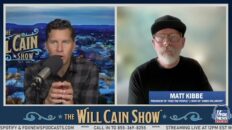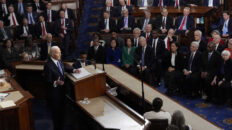One of the most exciting books of 2017 is James Scott’s Against the Grain: A Deep History of the Earliest States (Yale 2017). It deals with all the salient questions (that I care about in any case). In prehistoric times, how did human beings discover how to feed themselves? How did we decide to become settled in one spot rather than move around as hunters and gatherers? And the biggest question: where did the state come and why?
Scott is properly seen as a critic of the modern state, if not a full-blown anti-statist radical. The core of Scott’s fascinating argument is a fundamental challenge to conventional historiography of life on earth 15,000 or so years ago. Really, his range of speculation dates to as much as half a million years ago. What the mainstream view usually calls “civilization” is bound up with the appearance of agriculture, sedentary living, and stable states.
Scott, in contrast, draws attention to the downside of states, the taxes, the cruelty, war, slavery, institutionalized castes of elites, and so on, and argues that they might have diminished the quality of life as compared to what came before. In other words, he is raising a fundamental question about what we regard as being “civilized.” What if life was better before that happened?
This perspective is enough to distinguish him in academia today. He is properly seen as a critic of the modern state, if not a full-blown anti-statist radical.
What’s most interesting from a historical perspective is that he argues that there is no real relationship between sedentism (settled living) and becoming “civilized.” For this reason, he says, humankind resisted living in one place for many thousands of years precisely to avoid being trapped by states. We just wanted to be free. Not only that, hunter-gatherers had it pretty easy: a good diet, plenty of exercise, and leisure. By comparison, agricultural life was pretty terrible overall and our health declined.
Life Was Good
There is just a hint of left-anarchism (or even primitivist socialism) in the whole outlook. At first glance, it might appear as if Scott is advancing some far-flung Rousseauian fantasy about the blissful state of nature. Not so. He is trying to come to terms with the evidence as it stands, and assess the impact of state creation on human life. The general point has something of a Hayekian appeal: life was better when humans resisted organizing themselves and declined once they permitted themselves to be rounded up and regimented by a ruling class.
My worry, however, is that the Hayekian aspects are not the ones that stand out in his thesis. There is just a hint of left-anarchism (or even primitivist socialism) in the whole outlook. He suggests that maybe we should learn from our prehistoric ancestor. We too should be living off the land, moving around a lot, avoiding being “civilized” by big organizations and states.
Does Scott really believe that? In an interview with Vox, he assures us that he does not. Life is much better today than 10,000 years ago, he concedes (seems strange even to have to clarify that point!). However, like many others in his intellectual tradition, he does seem to take issue with the division of labor.
Modern industrial life has forced almost all of us to specialize in something, often in mundane, repetitive tasks. This is good for economic productivity but not so good for individual self-fulfillment. I think this has created a narrowing of attention to the larger world. Moving from hunting and gathering to working on an assembly line has made us more machine-like and less attuned to the world around us because we only have to be skilled at one thing.
Oh, now I get it: kind of like Marx. “In communist society,” Marx fantasized, “where nobody has one exclusive sphere of activity but each can become accomplished in any branch he wishes, society regulates the general production and thus makes it possible for me to do one thing today and another tomorrow, to hunt in the morning, fish in the afternoon, rear cattle in the evening, criticize after dinner, just as I have a mind, without ever becoming hunter, fisherman, shepherd or critic.”
Let’s just say that communism didn’t quite work that way in practice!
At some point, people had to stop stealing each other’s stuff, get smart, and come to agreement. And here we get to the most frustrating part of reading this otherwise exciting, adventurous, and challenging book: Scott does not seem to have an ear or nose for practical economic considerations, particularly as they pertain to the greatest invention of all, private property. His oversight here simply cannot be deliberate because it is so pervasive. It would appear that he is just not interested in the issue of private property as a technology of production, and that is too bad.
Moreover, he actually goes out of his way to nearly deny the historical importance of the emergence of private property norms. He seems to overlook the simple point: even if there was a time when nature provided enough for our needs without having to create additional wealth, at some point, humanity needed to find a way to overcome the scarcity of resources. We had to learn how to add to the store of available wealth to house, feed, and clothe ourselves. Scott never once says that; in fact, he seems to deny that scarcity played a significant role in human evolution.
Fire In the Hand
The oversight is frustrating because he otherwise has such insight in our history. When he speaks of the glory of fire, for example, Scott offers a beautiful observation.
But the passage raises other questions. Whose fire is it? How did the hominids divide up the cooked food? What were the rules? How did we keep track of claims and why? Plants, animals, and fire pits have rules concerning control rights (also known as ownership or private property) or else there will be nonstop conflict. A dictator or tribal leader could resolve conflicts, and perhaps some informal rules can help, but I’m speculating that centrally planning food production, cooking, and consumption for a spread-out and mobile tribe of hominids wouldn’t be easy.
Throughout the entire book, I kept getting my curiosity aroused: how did the technology of private property come into play? When? How did it work? How was it documented and what were the rules concerning its use? The single most frustrating element of this otherwise fascinating book is that Scott just doesn’t seem interested in the questions at all.
Ideology has blocked Scott from thinking about these issues very seriously. He writes with passion and vigor about the 4,000-year gap between the domestication of grains and animals and the eventual settling down of humans into organized and sedentary communities. But nowhere does he discuss what innovations in the rules of property claims made this possible.
Let’s get real. At some point, people had to stop stealing each other’s stuff, get smart, and come to agreement. As people, we have to trade our stuff for their stuff, which gives rise to the division of labor. The complexification of economic life extends from that. Forget anarcho-communist fantasies. This is how the world works.
Anthropology of Private Property
My own suspicion is that ideology has blocked Scott from thinking about these issues very seriously. Therefore, despite a sweeping and thrilling book on the prehistory of the state and civilization, we really are missing the insight that you get in, for example, Terence Kealey’s masterpiece Sex, Science, and Profits: How We Evolved To Make Money (2009) or Matt Ridley’s The Rational Optimist: How Prosperity Evolves (2010).
Ridley went so far as to argue that property and trade are what makes us distinctly human.
And Kealey covers the same timeframe as Scott but tells a different story, one that is more consistent with liberal theory. Humankind were hunters and gatherers so long as the food supply lasted but when scarcity threatened us, we got creative. We invented the norm of mine and thine and applied it to land and the products of production. In his view, it wasn’t the state that caused us to settle down and develop; it was born of necessity and flowed from the idea of property itself.
Kealey writes:
Scott, in contrast, seems to invoke a broader sense of what constitutes the state and it seems inclusive of the technology of documentary ownership rights. They seem to be inseparable in his mind. This strikes me as close to the Marxian view, though I’m sure that Scott would deny it.
More Hume, Less Marx
The notion advanced by Kealey is Humean rather than Lockean or Marxian, and stronger for that reason. Hume famously wrote the following about private property norms.
In other words, the human mind came up with norms concerning private property as a practical technology to make our lives better. This Humean view was embraced by Ludwig von Mises, who wrote in 1922 that private property emerges as a rational response to the existence of scarcity.
One coat, two people: what to do? Make another coat. “Several people may simultaneously look at a picture,” Mises writes, “even though the proximity of others, who perhaps keep him from the most favorable viewpoint, may disturb the enjoyment of any individual in the group; but a coat cannot be worn simultaneously by two people.”
One coat, two people: what to do? Make another coat. The best (only) way to do that with any concern for economizing on resources is by establishing ownership rights over threat and dyes and trading. Private property norms, then, emerge in response to a physical problem that impresses itself on the human mind most saliently when the need arises in the presence of the scarcity of goods.
This is why Mises says that “ownership is not a fact independent of the will and action of man.” The preservation and protection of property norms give rises to growing prosperity sufficient to overcome the fact that nature has not provided enough on its own. It is this norm, and not the state, which gave rise to civilization as we know it. Future, this course could be reversed if we failed to embrace and enforce this norm. “Our whole civilization,” writes Mises, “rests on the fact that men have always succeeded in beating off the attack of the re-distributors.”
Good History, Bad Theory
This is by itself a fascinating story, and it is not contradicted by Scott in his empirical account. It is only contradicted by Scott’s deeper theory, which seems to identify statism with ownership, trade, the division of labor, and the rise of civilization.
Here is why reading Scott can be at once enlightening and frustrating. The reader has the sense that he is onto something. You want to take a college class with him. You want to take notes. You want to delight that he seems to be discussing all that stuff that matters. At the same time, you want to refocus his attention on the central problem of scarcity and property that he seems so interested in avoiding at all costs.
This article originally appeared on FEE.














Add comment